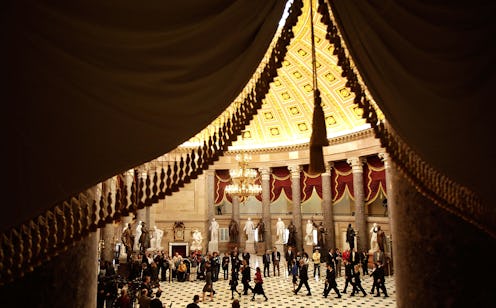News
Why Electors Stay & Vote In Their Home States Only
On Dec. 19, American electors met in their respective state capitols and cast their ballots for president and vice president. These 538 electors comprise the group actually responsible for selecting each American leader, in a process voters have become (perhaps unwillingly) very familiar with. Of the various questions arising about the Electoral College, one of the most obvious is why they don't meet altogether, and keep it strictly local. And the answer dates back to the beginnings of the republic itself, as members of the Constitutional Convention worried that a centralized meeting would make electors prey to manipulation.
The process of electing the presidential ticket was one of the most contentious for the nation's founders, and it clearly remains a hotly debated topic. Many of the founders were nervous about "mob rule" in using a direct vote to elect the president. James Madison in particular feared the rise of demagogues and populists, should such a system be adopted. Smaller states also disliked the idea of a direct vote, since it meant their influence would be minimized. They thought big states with large populations would dictate the terms for everyone else. So eventually, the Electoral College hybrid came into being, an eccentric system which attempts to account for population size, state autonomy, and in today's version, what the voters themselves want. (Electors were originally chosen by state legislatures, removing by another degree the notion of entertaining the "will of the people.")
The Electoral College, and in fact, the entire process for nominating and electing the president and vice president, have been amended a great deal of times. But interestingly, the Electoral College has never met together. Since the country's inception, electors have met and voted in their respective states, sending their results to Washington, D.C. According to the History Channel, this was done "in order to forestall partisan intrigue and manipulation." This likely was a greater risk in the original voting process, wherein electors cast ballots for their first and second choice for president, and the candidate with the most votes went on to become POTUS. The second-place finisher got the consolation prize of becoming vice president. In such a setup, the quid pro quo wrangling possibilities are as endless as one's imagination.
That would hardly be the case today, with electors casting one ballot for president, and a secondary ballot for vice president. Still, precedent is a powerful thing in any system, perhaps most sticky in a sprawling democracy like our own. Witness the perpetuity of the Electoral College itself, despite longstanding and widespread opposition to it. At any rate, the Electoral College has never met as a whole group, and there's no reason to suspect that it ever will.
